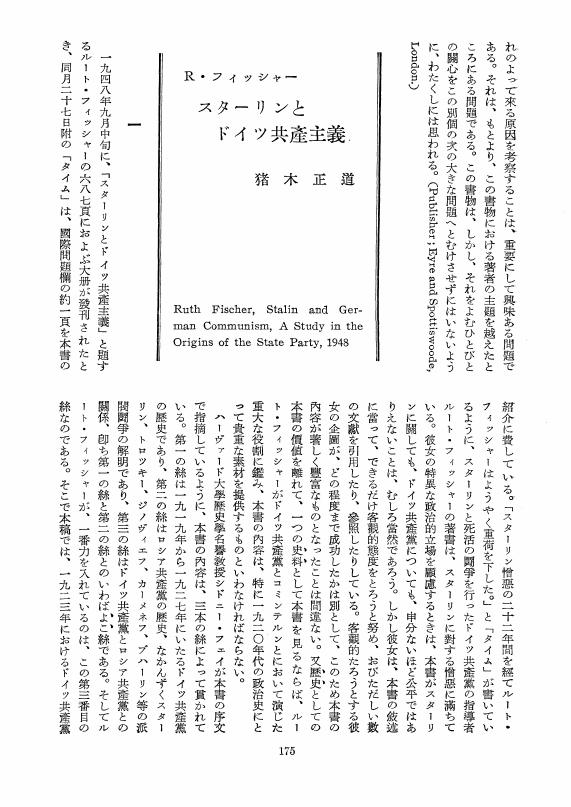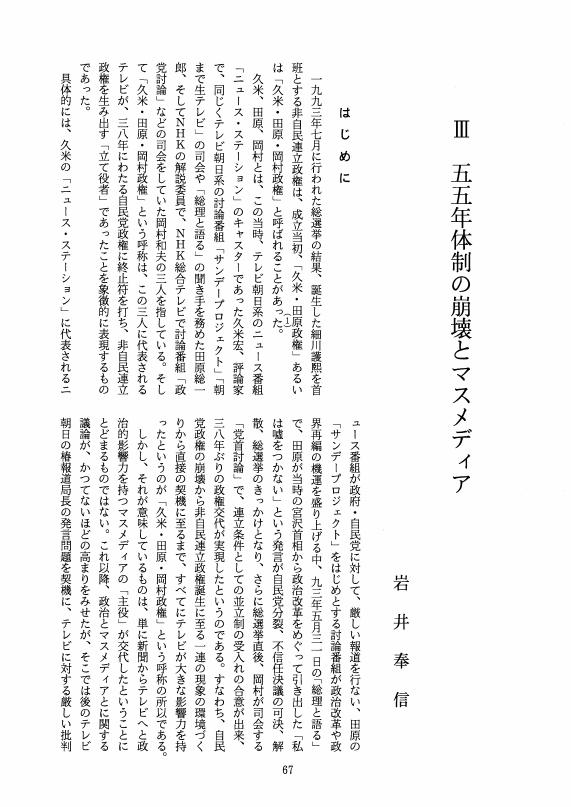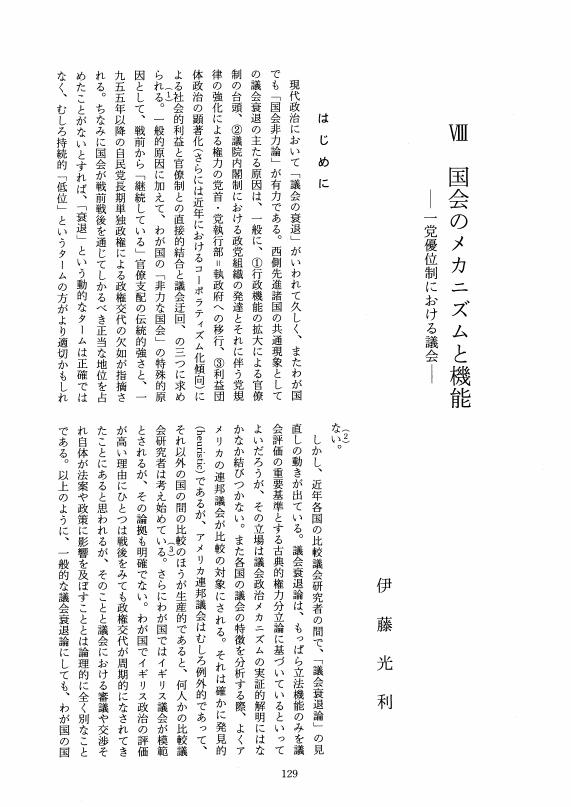3 0 0 0 OA 無国籍者をめぐる越境とアイデンティティ
- 著者
- 陳 天璽
- 出版者
- JAPANESE POLITICAL SCIENCE ASSOCIATION
- 雑誌
- 年報政治学 (ISSN:05494192)
- 巻号頁・発行日
- vol.58, no.2, pp.2_29-2_48, 2007 (Released:2012-11-06)
This article uses cases of statelessness to examine the political dynamic of exclusion and inclusion involved in a system of nationality. Stateless person means a person with no nationality or one who is not legally a citizen of any nation state. Here, I will pay attention to two cases, one that of ethnic Koreans in Japan, and the other Japanese war orphans coming from China to live in Japan. These two cases are similar in some ways. Firstly, the migrations were forced by the socio-political environment. Secondly, transitions in international relations and the changing policies of nation states resulted in the alteration of their nationalities and even led them to become stateless. Issues of stateless persons have been neglected and seldom paid attention to. Here, by analyzing these two cases, especially concerning (1) historical background and clarification of how they became stateless, (2) the gap between identity card designations and real nationality, and (3) the mental effects of being stateless, this paper would like to stress the existence of stateless people by clarifying the political dynamic of nationality which has been excluding them. Also, this paper would like to suggest the importance of studying stateless people in this global era, a group of people with a unique identity free from nationalism and ethnicity.
3 0 0 0 OA 《オーストリア国民》意識の形成過程-ナショナルな価値と普遍的価値-
- 著者
- 村松 恵二
- 出版者
- JAPANESE POLITICAL SCIENCE ASSOCIATION
- 雑誌
- 年報政治学 (ISSN:05494192)
- 巻号頁・発行日
- vol.45, pp.23-39, 1994-12-22 (Released:2009-12-21)
3 0 0 0 OA 現代ドイツの政党政治
- 著者
- 小野 耕二
- 出版者
- JAPANESE POLITICAL SCIENCE ASSOCIATION
- 雑誌
- 年報政治学 (ISSN:05494192)
- 巻号頁・発行日
- vol.52, pp.17-32, 2002-01-30 (Released:2009-12-21)
3 0 0 0 OA ドイツ国家学の現況と国家概念
- 著者
- 新田 邦夫
- 出版者
- JAPANESE POLITICAL SCIENCE ASSOCIATION
- 雑誌
- 年報政治学 (ISSN:05494192)
- 巻号頁・発行日
- vol.32, pp.81-95, 1982-10-08 (Released:2009-12-21)
3 0 0 0 OA R・フィッシャー「スターリンとドイツ共産主義」
- 著者
- 猪木 正道
- 出版者
- Japanese Political Science Association
- 雑誌
- 日本政治學會年報政治學 (ISSN:05494192)
- 巻号頁・発行日
- vol.1, pp.175-189, 1950-10-20 (Released:2009-12-21)
- 著者
- 田中 愛治
- 出版者
- JAPANESE POLITICAL SCIENCE ASSOCIATION
- 雑誌
- 年報政治学 (ISSN:05494192)
- 巻号頁・発行日
- vol.47, pp.31-66, 1996-12-10 (Released:2009-12-21)
3 0 0 0 OA 昭和天皇と政党内閣制 -明治立憲制の変容と天皇の役割像
- 著者
- 村井 良太
- 出版者
- JAPANESE POLITICAL SCIENCE ASSOCIATION
- 雑誌
- 年報政治学 (ISSN:05494192)
- 巻号頁・発行日
- vol.55, pp.157-169, 2005-01-21 (Released:2009-12-21)
3 0 0 0 OA 「第三の道」と社会の変容
- 著者
- 齋藤 純一
- 出版者
- JAPANESE POLITICAL SCIENCE ASSOCIATION
- 雑誌
- 年報政治学 (ISSN:05494192)
- 巻号頁・発行日
- vol.52, pp.143-154, 2002-01-30 (Released:2009-12-21)
- 参考文献数
- 30
3 0 0 0 OA 政策情報と投票参加
- 著者
- 堀内 勇作 今井 耕介 谷口 尚子
- 出版者
- JAPANESE POLITICAL SCIENCE ASSOCIATION
- 雑誌
- 年報政治学 (ISSN:05494192)
- 巻号頁・発行日
- vol.56, no.1, pp.161-180,352, 2005-11-10 (Released:2010-04-30)
Political scientists have hypothesized that more policy information leads to a higher voter turnout. To empirically test this hypothesis, we conducted an Internet-based randomized field experiment during Japan's 2004 Upper House election. Japan's 2004 election is ideal for testing our hypothesis because political parties proposed formal policies or “manifestos”. We find that voters are less likely to abstain when they receive policy information about both ruling and opposition parties through their official party websites. The information effects are larger among those voters who were planning to vote but were undecided about which party to vote for.Additionally, our experimental approach avoids the problem of endogenous information acquisition, which is inherent when using observational studies to estimate the causal effects of information on voting behavior. Furthermore, we employ a randomized block design to ensure efficient randomization, and apply a Bayesian statistical model to account for non-compliance and non-response, the two prevailing problems of field experiments.
3 0 0 0 OA 分割政府の比較政治学
- 著者
- 待鳥 聡史
- 出版者
- JAPANESE POLITICAL SCIENCE ASSOCIATION
- 雑誌
- 年報政治学 (ISSN:05494192)
- 巻号頁・発行日
- vol.60, no.1, pp.1_140-1_161, 2009 (Released:2013-02-07)
- 参考文献数
- 26
This article proposes a framework for the comparative study of divided government and applies it to the U.S. cases. A recent theory of comparative politics, comparative analysis of political institutions, emphasizes there are many variations of the presidential systems. They come from two institutional arrangements: electoral and executive rules. These rules lead to the variations of divided governments by making differences in party systems and organizations. In the case of American divided government, it had been a combination of two-party competition and weak intra-party unity until the 1970s. Since the 1980s, however, American two-party system has been with a strong intra-party cohesion. This transformation has also changed the policymaking process of the divided government. By some data and a case study, the author finds that confrontations between the President and Congressional majority party become sharper, although these are continued not so long.
3 0 0 0 OA 政治的官僚と行政的政治家 -現代日本の政官融合体制-
- 著者
- 飯尾 潤
- 出版者
- JAPANESE POLITICAL SCIENCE ASSOCIATION
- 雑誌
- 年報政治学 (ISSN:05494192)
- 巻号頁・発行日
- vol.46, pp.135-149, 1995-12-21 (Released:2009-12-21)
3 0 0 0 E・フロム「自由の恐怖」
- 著者
- 岡 義達
- 出版者
- JAPANESE POLITICAL SCIENCE ASSOCIATION
- 雑誌
- 年報政治学 (ISSN:05494192)
- 巻号頁・発行日
- vol.2, pp.107-119, 1951
2 0 0 0 OA 五五年体制の崩壊とマスメディア
- 著者
- 岩井 奉信
- 出版者
- JAPANESE POLITICAL SCIENCE ASSOCIATION
- 雑誌
- 年報政治学 (ISSN:05494192)
- 巻号頁・発行日
- vol.47, pp.67-88, 1996-12-10 (Released:2009-12-21)
2 0 0 0 OA 運命と平等
- 著者
- 飯田 文雄
- 出版者
- JAPANESE POLITICAL SCIENCE ASSOCIATION
- 雑誌
- 年報政治学 (ISSN:05494192)
- 巻号頁・発行日
- vol.57, no.1, pp.11-40,314, 2006-11-10 (Released:2010-04-30)
This paper attempts to clarify the ways in which recent egalitarians have differentiated themselves by examining their core idea to neutralize the influence of different kinds of luck in distributive justice. The paper first highlights the ways in which both resourcist and welfarist egalitarians have accepted the idea of neutralizing the influence of luck in reference to the arguments of Ronald Dworkin and Richard Arneson until 1990's. Second, the paper focuses on the way in which Elizabeth Anderson criticized both of these egalitarian formulations under the labeling of “luck egalitarianism”. Finally, this paper examines the different ways in which both resourcist and welfarist responded to the objections of Anderson in reference to the recent development of Dworkin's insurance schemes and Arneson's responsibility-catering prioritarianism. The paper concludes that the idea of neutralizing the influence of luck still plays an important role in egalitarian theory today, although some important revisions are indispensable to provide for the possible objections.
2 0 0 0 OA 満州国協和会の政治的展開-複数民族国家におげる政治的安定と国家動員-
- 著者
- 平野 健一郎
- 出版者
- JAPANESE POLITICAL SCIENCE ASSOCIATION
- 雑誌
- 年報政治学 (ISSN:05494192)
- 巻号頁・発行日
- vol.23, pp.231-283, 1973-03-30 (Released:2009-12-21)
2 0 0 0 OA 1967年11月の佐藤訪米と沖縄返還をめぐる日米交渉
- 著者
- 中島 琢磨
- 出版者
- JAPANESE POLITICAL SCIENCE ASSOCIATION
- 雑誌
- 年報政治学 (ISSN:05494192)
- 巻号頁・発行日
- vol.60, no.1, pp.1_208-1_231, 2009 (Released:2013-02-07)
PM Sato's Visit to the U.S. in November 1967 was one of the important phases in the process of the reversion of Okinawa to Japan. In the Joint Statement following the summit meeting, the two governments announced the agreement on keeping the status of the Ryukyu Islands under joint review, guided by the aim of reversion. Furthermore, the joint communiqué referred to Sato's hope that the agreement would be reached between the two governments “within a few years” on the date for the reversion of the Ryukyu Islands. As it turned out, the two governments agreed on the time of Okinawa reversion two years later. This article analyzes the Japan-U.S. summit meeting in November 1967, with special focus on the process of completing the joint communiqué through negotiations. The negotiation process was characterized by its complexity. While Japan's Ministry of Foreign Affairs conducted negotiations with its U.S. counterparts, Sato sent his personal emissary to the White House to negotiate on setting the timetable for the reversion “within a few years.” This was because the MOFA had had a negative attitude toward Sato's plan. This article examines the development of Japanese “dual diplomacy” on the basis of documents from both countries.
2 0 0 0 OA 西欧マルクス主義の国家論と政治学
- 著者
- 加藤 哲郎
- 出版者
- JAPANESE POLITICAL SCIENCE ASSOCIATION
- 雑誌
- 年報政治学 (ISSN:05494192)
- 巻号頁・発行日
- vol.32, pp.151-180, 1982-10-08 (Released:2009-12-21)
2 0 0 0 OA 大正後期の「内地在留朝鮮人」に対する「善導」主義的政策の論理と実態
- 著者
- 宮地 忠彦
- 出版者
- JAPANESE POLITICAL SCIENCE ASSOCIATION
- 雑誌
- 年報政治学 (ISSN:05494192)
- 巻号頁・発行日
- vol.58, no.2, pp.2_163-2_183, 2007 (Released:2012-11-06)
This paper analyzes the Japanese police's “Zendo-shugi” policy to the Korean residents in the late Taisho period. It aimed to ease the discontent of the Korean residents except “Hutei(dangerous)” Koreans. It was influenced mainly by the new policy of the Government-General of Korea after the March First movement and also partly by the new policy of the Japanese police after the Rice Riot and the former colonial bureaucrats and their policy. In rivalry with the judiciaries, the police tried to understand the anti-Japanese sentiment of the Koreans and satisfy them. But it tended to provoke the Koreans' antipathy toward its interference and had a problem that “Zendo” raised the Korean nationalism. And it was difficult for the police to realize the policy because lower-ranking policemen couldn't understand the “Zendo-shugi”. And further, as some Korean immigrant workers the police hadn't seen dangerous sometimes resorted to violence, the police had trouble in distinguishing dangerous Koreans from good Koreans
2 0 0 0 OA 国会のメカニズムと機能- 一党優位制における議会-
- 著者
- 伊藤 光利
- 出版者
- JAPANESE POLITICAL SCIENCE ASSOCIATION
- 雑誌
- 年報政治学 (ISSN:05494192)
- 巻号頁・発行日
- vol.38, pp.129-147, 1988-03-30 (Released:2009-12-21)
2 0 0 0 OA 民主制と独裁制の生存条件
- 著者
- 三上 了
- 出版者
- JAPANESE POLITICAL SCIENCE ASSOCIATION
- 雑誌
- 年報政治学 (ISSN:05494192)
- 巻号頁・発行日
- vol.56, no.2, pp.146-169,252, 2005 (Released:2010-04-30)
- 参考文献数
- 24
When and why does breakdown of political systems occur? Recent empirical works on regime changes have failed to address this question properly because their frameworks conventionally treat onset and outcome of political transitions as the same problem.Conceptualizing the dependent variable more precisely and using an original data set that covers all system transformations in the 20th century, this paper reexamines the various hypotheses concerning sustainability of political systems. The factors analyzed here include: development level, resource dependence, economic inequality, social fractionalization, position in the world system, inflation, and economic recession.The results indicate that although some factors have a common destabilizing effect, other factors act in the opposite direction between the two types of regime at risk. The regression models also reveal that dictatorships are more vulnerable to situational changes whereas democracies are immune to these threats: their survival depends more on the structural differences instead.











